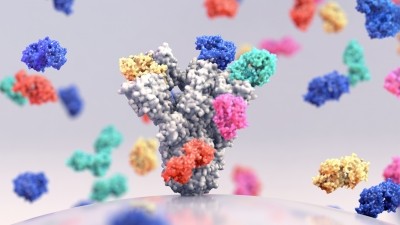Global biosimilar market estimated to reach a size of $43.8 billion by the end of 2024

The biosimilars market is rapidly growing as global demand for biosimilars continues to grow. The global biosimilar market is estimated to reach a size of $43.8 billion by the end of 2024, and to grow over $100 billion in the next 10 years.
Biologics are expensive medications, which is driving up the popularity of biosimilars as a more cost-effective alternative. Since the first biosimilar was approved by the FDA in 2015, the amount of biosimilars hitting the shelves in the past 10 years has grown exponentially, especially as more and more patents protecting the exclusivity of blockbuster biologic drugs expire, opening up an opportunity for multiple competitors to enter a rapidly growing market.
In 2024 to date, a total of 10 biosimilars have received approval in the US and in Europe. Of them, three are biosimilars to Johnson & Johnson’s Stelara and another three to Bayer’s Eylea. The patents for both biologics have recently expired, which has led multiple competitors to start preparations for the launch of biosimilars to these two blockbuster drugs, which were both within the top 20 best-selling drugs in 2023 worldwide.
Here is the full list of all biosimilars approved in the US and Europe in 2024 so far, from most to least recent approval dates.
Pyzchiva
Developers: Sandoz and Samsung Bioepis
Biosimilar to: Johnson & Johnson’s Stelara
The FDA approved Pyzchiva (ustekinumab-ttwe) in July 2024 to treat plaque psoriasis, active psoriatic arthritis, Crohn’s disease and ulcerative colitis in adults, as well as moderate to severe plaque psoriasis and active psoriatic arthritis in pediatric patients.
Sandoz will be responsible for commercializing the biosimilar in the US, which is expected to reach the market in February 2025 following a licensing agreement reached by J&J and Samsung Bioepis in November last year that ended their patent litigation.
Pyzchiva received EMA approval in February this year, making it one of the first Stelara biosimilars to be authorized in Europe. Sandoz and Samsung Bioepis expect it to be part of a wave of Stelara biosimilars that will launch over the coming months.
Ahzantive
Developer: Formycon
Biosimilar to: Bayer and Regeneron Pharmaceuticals’ Eylea
The FDA granted approval to Ahzantive (aflibercept-mrbb) in July 2024 for the treatment of age-related neovascular macular degeneration (nAMD) and other retinal diseases such as diabetic macular edema (DME), diabetic retinopathy (DR) and macular edema following retinal vein occlusion (RVO).
Ahzantive is a biosimilar to Eylea, which is currently the best-selling drug in the field of anti-VEGF therapies, reaching global sales of $9.4 billion in 2023. However, the blockbuster’s sales have been slowing down compared to the previous year as biosimilars have started entering the market.
The FDA approval of Ahzantive came shortly after the first interchangeable Eylea biosimilars were approved in May this year. Formycon has submitted a marketing authorization application with the EMA, and expects a decision by early 2025 at the latest.
Yesafily & Opuviz
Developer: Biocon Biologics/Samsung Bioepis and Biogen
Biosimilar to: Bayer and Regeneron Pharmaceuticals’ Eylea
Yesafily (aflibercept-jbvf) and Opuviz (aflibercept-yszy) received FDA approval in May as interchangeable biosimilars to Eylea to treat neovascular (wet) age-related macular degeneration, macular edema following retinal vein occlusion, diabetic macular edema, and diabetic retinopathy.
They are the first biosimilars to Eylea to carry interchangeable designation, meaning they can be swapped at the pharmacy counter without a doctor’s instructions. Eylea has been facing competition since the approval of Roche’s biosimilar Vabysmo in October 2023, and several other biosimilars have been joining the game this year.
Yesafily will be manufactured and marketed by Biocon Biologics, while Opuviz will be manufactured by Samsung Bioepis and marketed by Biogen in the US. Yesafily had previously received EU and UK approval in 2023.
Hercessi
Developer: Accord Biopharma and Shanghai Henlius Biotech
Biosimilar to: Roche’s Herceptin
The FDA gave the green light to Hercessi (trastuzumab-strf) in April for the treatment of several forms of HER2-overexpressing cancer, including breast cancer and gastric or gastroesophageal junction adenocarcinoma.
Hercessi is the first biosimilar by Accord Biopharma to receive FDA approval, and the sixth biosimilar to Roche’s Herceptin (trastuzumab) to be approved in the US. Herceptin has been facing competition from biosimilars since the approval of Biocon Biologics’ Ogivri (trastuzumab-dkst) in December 2017.
The biosimilar was originally developed by Shanghai Henlius Biotech. In 2021, the company gave Accord Biopharma exclusive rights to develop and commercialize Hercessi in the US and Canada.
Selarsdi
Developers: Alvotech and Teva
Biosimilar to: Johnson & Johnson’s Stelara
The FDA approved Selardsi (ustekinumab-aekn) in April for the treatment of moderate to severe plaque psoriasis and for active psoriatic arthritis in adults and pediatric patients.
Selarsdi is one of several Stelara biosimilars that have received approval over the course of 2024. Stelara reported $10.9 billion in sales last year, but this number will likely be decreasing in coming years as competition grows. The biosimilar will reach the US market in February 2025, following a settlement and licensing agreement between the developers and Johnson & Johnson in June last year.
Selarsdi is the second biosimilar by Teva to receive approval this year after Simlandi, a biosimilar to Humira. Under the terms of its partnership with Alvotech, Teva is responsible for the exclusive commercialization of the biosimilar in the US.
Wyost & Jubbonti
Developer: Sandoz
Biosimilar to: Amgen’s Xgeva/Prolia
Wyost and Jubbonti received approval from the FDA in March and from the European Commission in May for the treatment of cancer-related bone disease and osteoporosis, respectively. In the US, they received interchangeable designation, allowing pharmacists to swap them without approval from a doctor.
They are the first and only biosimilar versions of their reference medicines, Xgeva and Prolia (denosumab). Both drugs received their initial approval in 2010 and reported $4 billion and $2.1 billion in sales last year, respectively.
Sandoz plans to launch both biosimilars in May 2025, according to the settlement reached with Amgen following a patent dispute. The European launch is expected around November 2025.
Simlandi
Developers: Alvotech and Teva
Biosimilar to: AbbVie’s Humira
The FDA gave the nod to Simlandi (adalimumab-ryvk) in February 2024 for the treatment of multiple immune conditions including rheumatoid arthritis, Crohn’s disease, ulcerative colitis, plaque psoriasis, and hidradenitis suppurativa among others.
Simlandi is the first high-concentration biosimilar to Humira (adalimumab) to be granted interchangeability status by the FDA. According to Teva, nearly 88% of US prescriptions for adalimumab are for high-concentration formulations. This presents a promising opportunity for the biosimilar to compete with Humira, which is still the world’s second-best selling drug despite the fact that numerous biosimilars have been approved since its patent expired. In 2023, Humira reported $14.4 billion in global sales.
Teva and Alvotech originally planned to launch Simlandi in 2023, but an FDA inspection at Alvotech’s plant in Iceland revealed quality control issues that led to a rejection. Despite this setback, Simlandi finally received approval this year and was commercially launched in May.
Uzpruvo
Developers: STADA and Alvotech
Biosimilar to: Johnson & Johnson’s Stelara
The European Commission approved Uzpruvo in January, making it the first Stelara (ustekinumab) biosimilar to be approved in Europe. Uzpruvo gained approval in several indications within gastroenterology, dermatology and rheumatology, but the approval excluded ulcerative colitis, a condition for which Stelara still has exclusivity.
The biosimilar was launched in July 2024, immediately after the expiration of Stelara’s exclusive rights to treat multiple conditions. Uzpruvo is the second biosimilar launched through the partnership between STADA and Alvotech, following the launch of a Humira biosimilar named Hukyndra in 2022.
The developers are still waiting for FDA approval of Uzpruvo, but they have already signed a licensing agreement with Johnson & Johnson that will allow the launch of the biosimilar in the US in February 2025 subject to regulatory approval.











